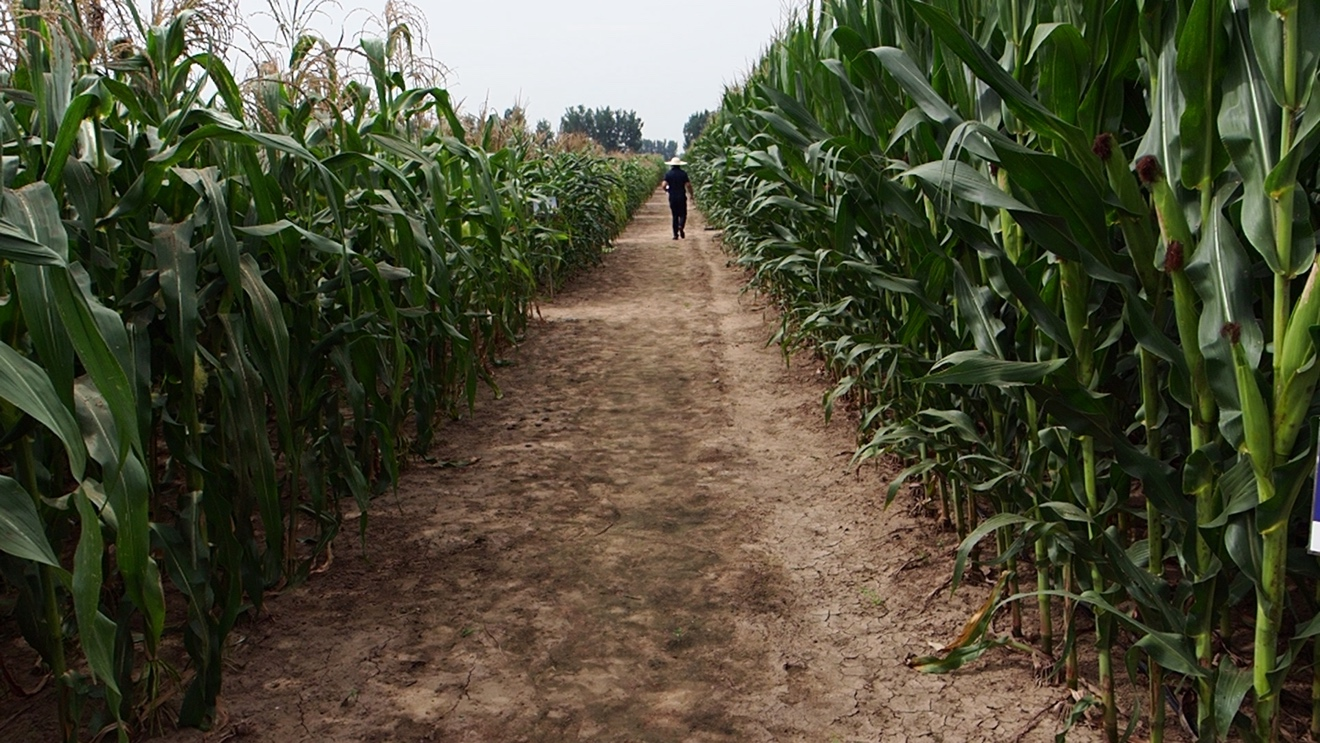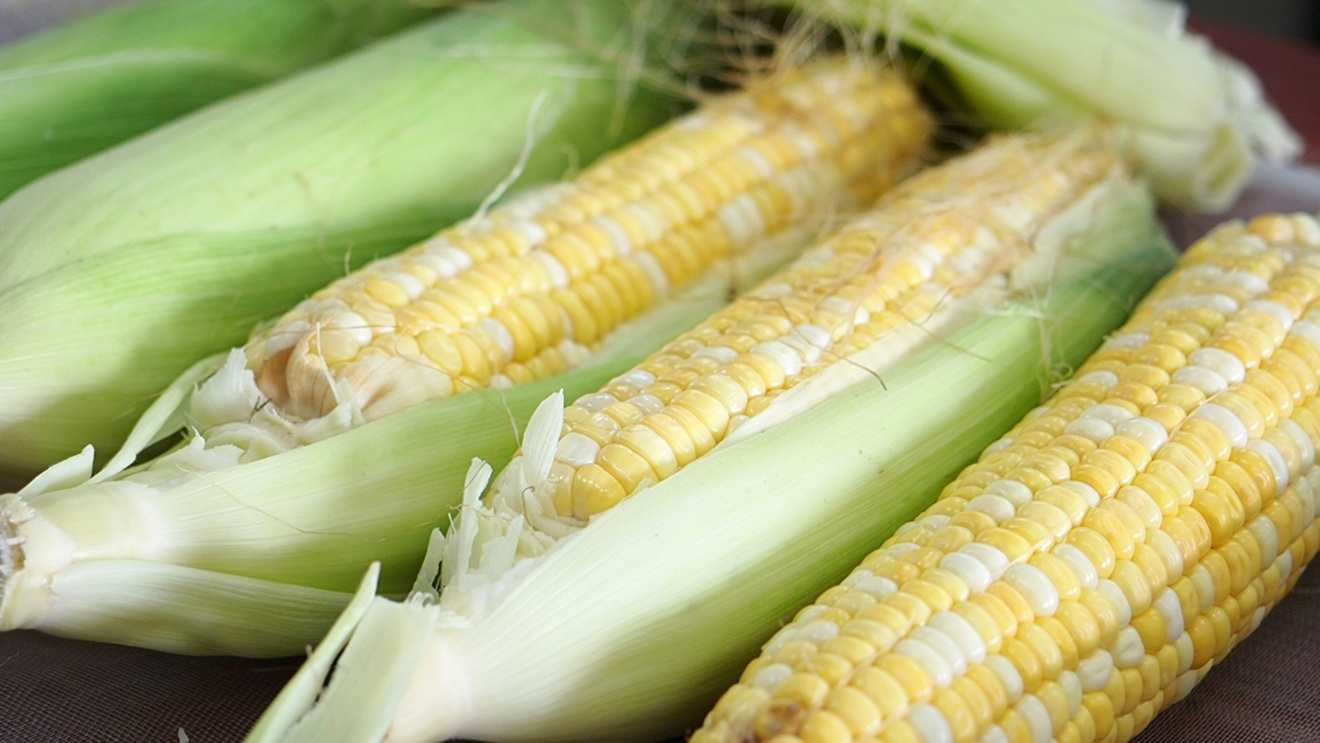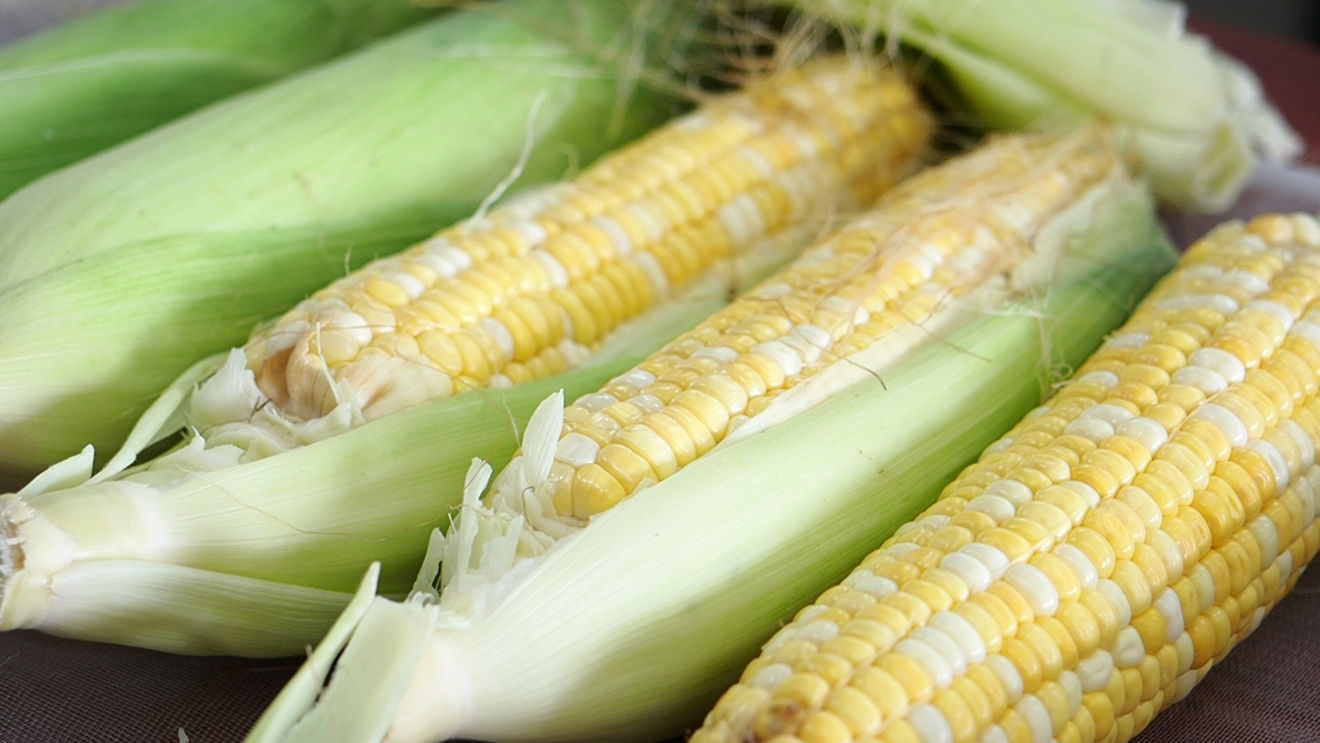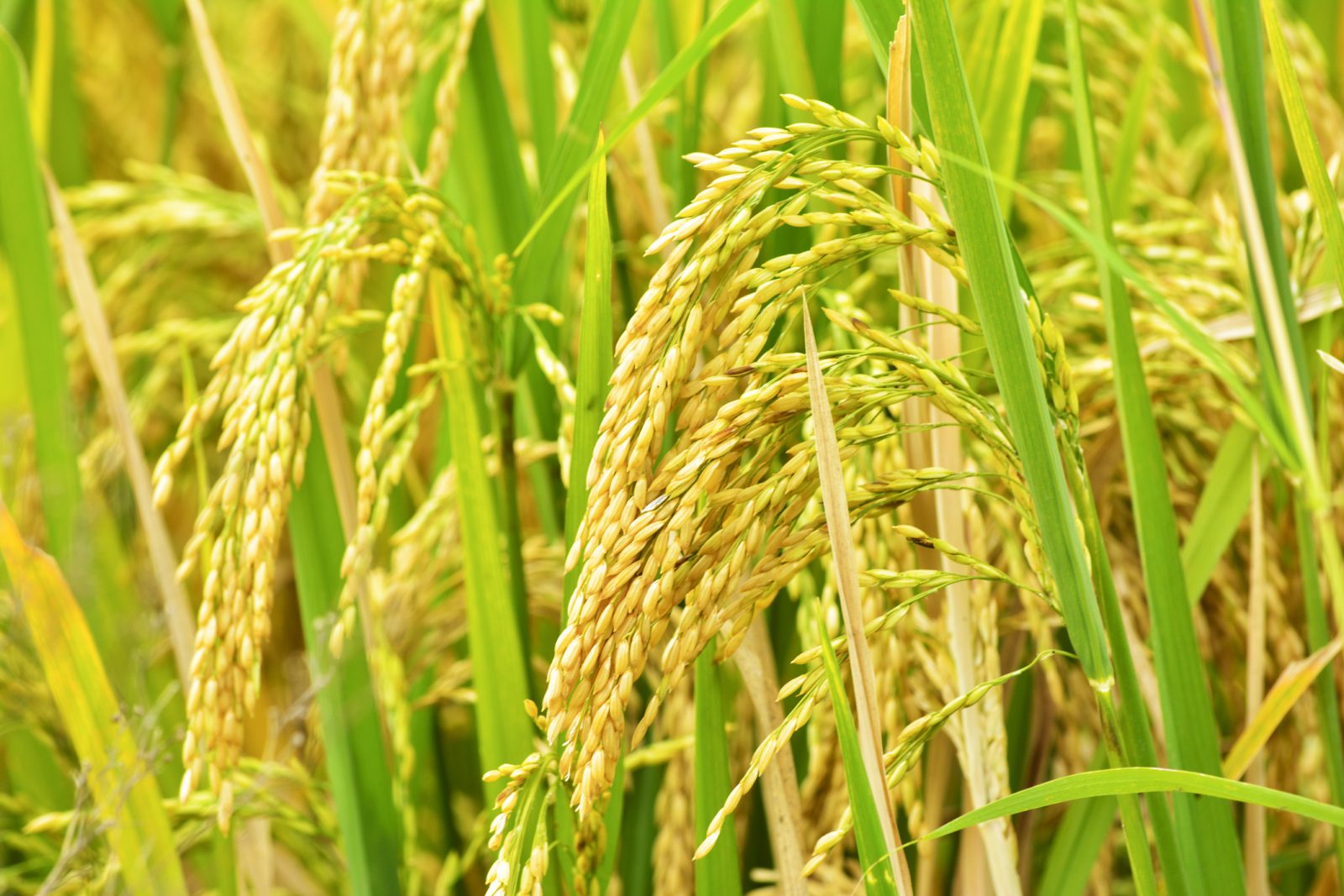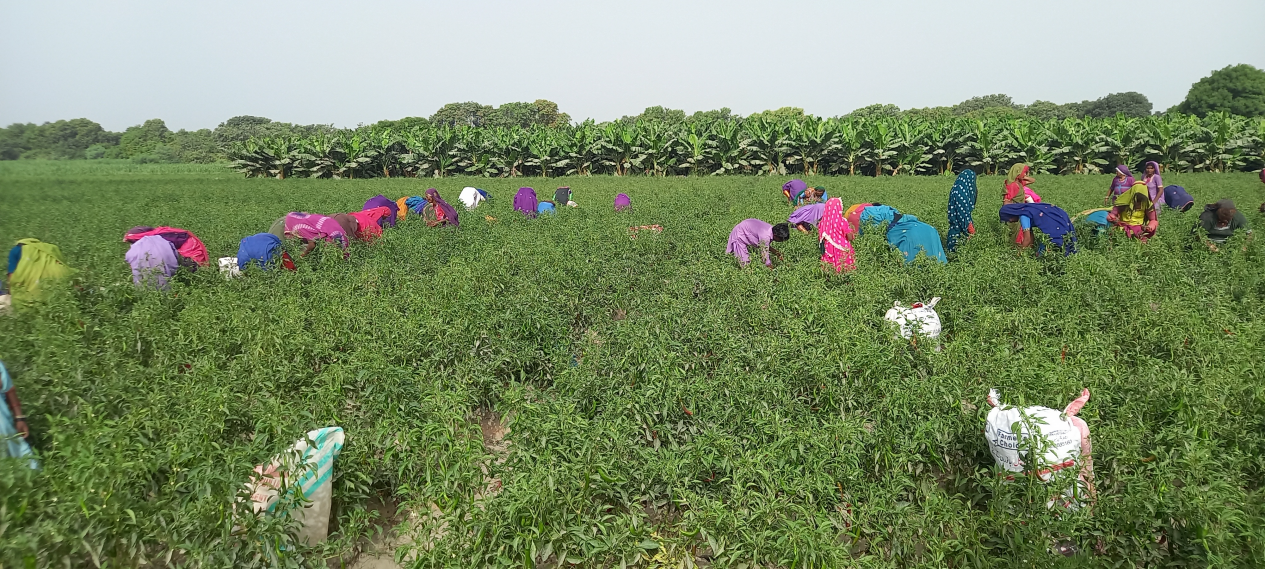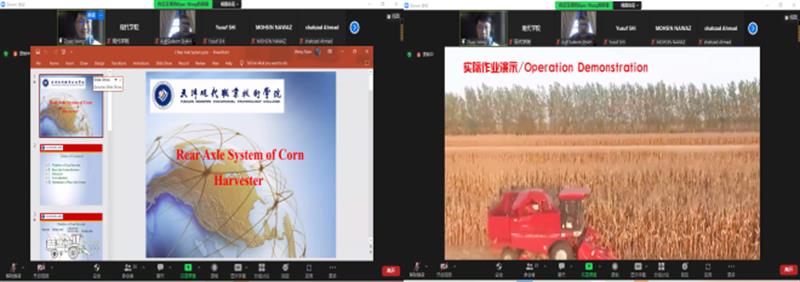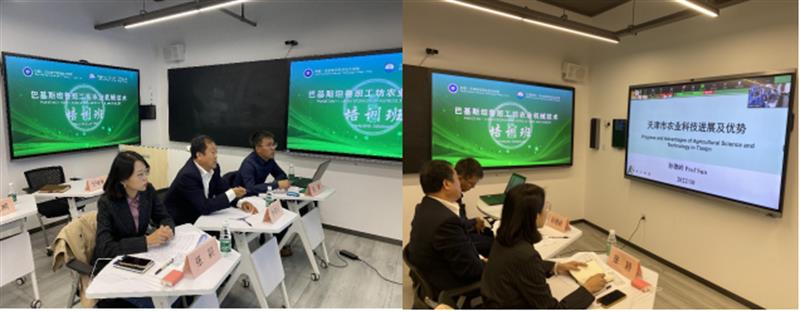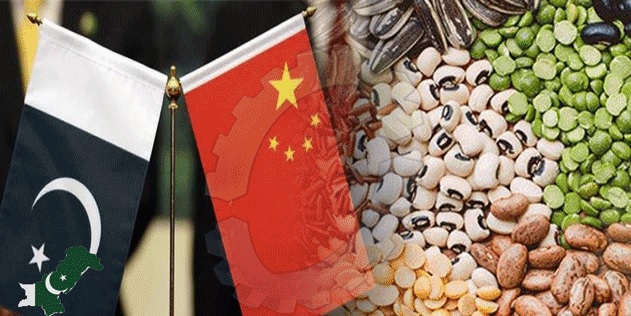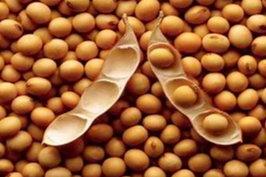ghazi52
PDF THINK TANK: ANALYST

- Joined
- Mar 21, 2007
- Messages
- 101,790
- Reaction score
- 106
- Country
- Location
.,..

Palai valley produces quality blood red oranges. [Photo by Tahir Ali/Gwadar Pro]
PESHAWAR, Jan. 8 (Gwadar Pro) - Malakand district in northwestern Khyber Pakhtunkhwa (KP) is a strategically important position, which gives access to the ancient, beautiful valley of “Udyana” (Swat). Palai is a small valley in lower Malakand, known for producing high-quality oranges (called malta, citrus sinensis). Palai is the center of a cluster of seven villages namely Bara Bazdara, Koza Bazdara, Sherkhana, Zormandai, Mora Banda and Zangal, all producing citrus for decades.
The oranges of Palai are popular due to their distinctive aroma, taste, color and size. Although the sandy loamy soil of Palai valley is suitable for cultivating oranges, especially the blood-red citrus until recently the lack of a proper irrigation system limited its cultivation to household consumption instead of commercial sale and consumption.
According to Raham Khaliq, a local cultivator, in the early 1980s farmers started digging tube wells running with electric power generators, leading to an increase in citrus orchards. Some farmers also established similar orchards with tube wells running with diesel generators. Hence, with the advent of tube wells in the area, citrus production increased and people began to sell their fruits in nearby markets. However, the majority of the tube wells were established near villages, so remote uninhabited areas, with no electricity supply line, remained barren, or people cultivated wheat, maize and other such crops relying on rainwater.
Talking to Gwadar Pro, Raham Khaliq said that the malta of Palai had established itself in the market due to its quality. In recent years, the number of citrus orchards increased a lot after farmers started installing solar-powered tube wells in their fields. Apart from citrus, local people also cultivate peaches, guavas, tomatoes and other vegetables.
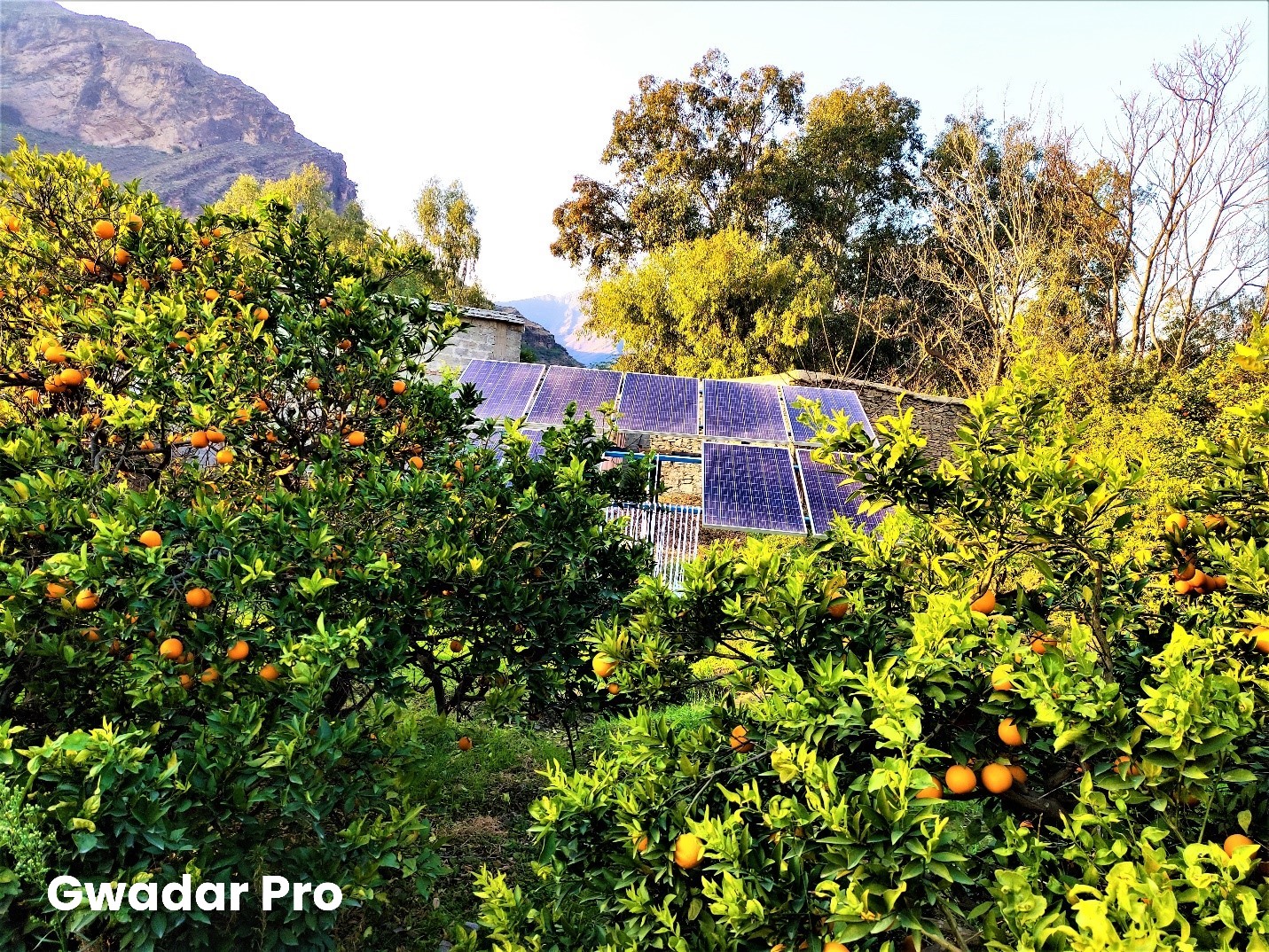
Orange orchard irrigated with solar-powered tube well in Sherkhana village. [Photo by Tahir Ali/Gwadar Pro]
Afzal Hussain installed a solar-powered pump on his tube-well in Bara Bazdara village about five years ago. The tube well brought about a revolution in his farming and he began the cultivation of malta, peaches and tomatoes in his fields, which for centuries had relied only on rainwater and produced only wheat and corn. “Today my land is not only a source of income for my family but our orchards have provided informal jobs for several locals,” .
Zahid Shah is another farmer from Sherkhana village who uses both electric and diesel operated tube-wells to water his orange orchards. However, he is thinking of switching to a solar-powered tube-well. “Due to frequent load-shedding and low voltage and soaring gasoline prices, I am going to move to solar tube-wells,” he told Gwadar Pro adding that many cultivators have started using solar systems and even the arid hilly areas have turned green due to solar-powered tube wells.
The area with bright blue sky and powerful sun receive more than 10 hours of sunlight making it conducive for solar system installation.
Abdur Rahim runs a small engineering workshop in Batkhela, the headquarters of the Malakand district. Although he is not an engineer with a university degree, he has acquired expertise in the solar energy system and has installed many solar systems to meet the electricity needs of households and farms.
Talking to Gwadar Pro, Abdur Rahim said the solar-powered tube wells have brought about an agricultural revolution in the Malakand area. People have started growing fruit trees and cultivating wheat and maize on those arid lands which until recently were only suitable for shrubs while some planted eucalyptus in those fields.
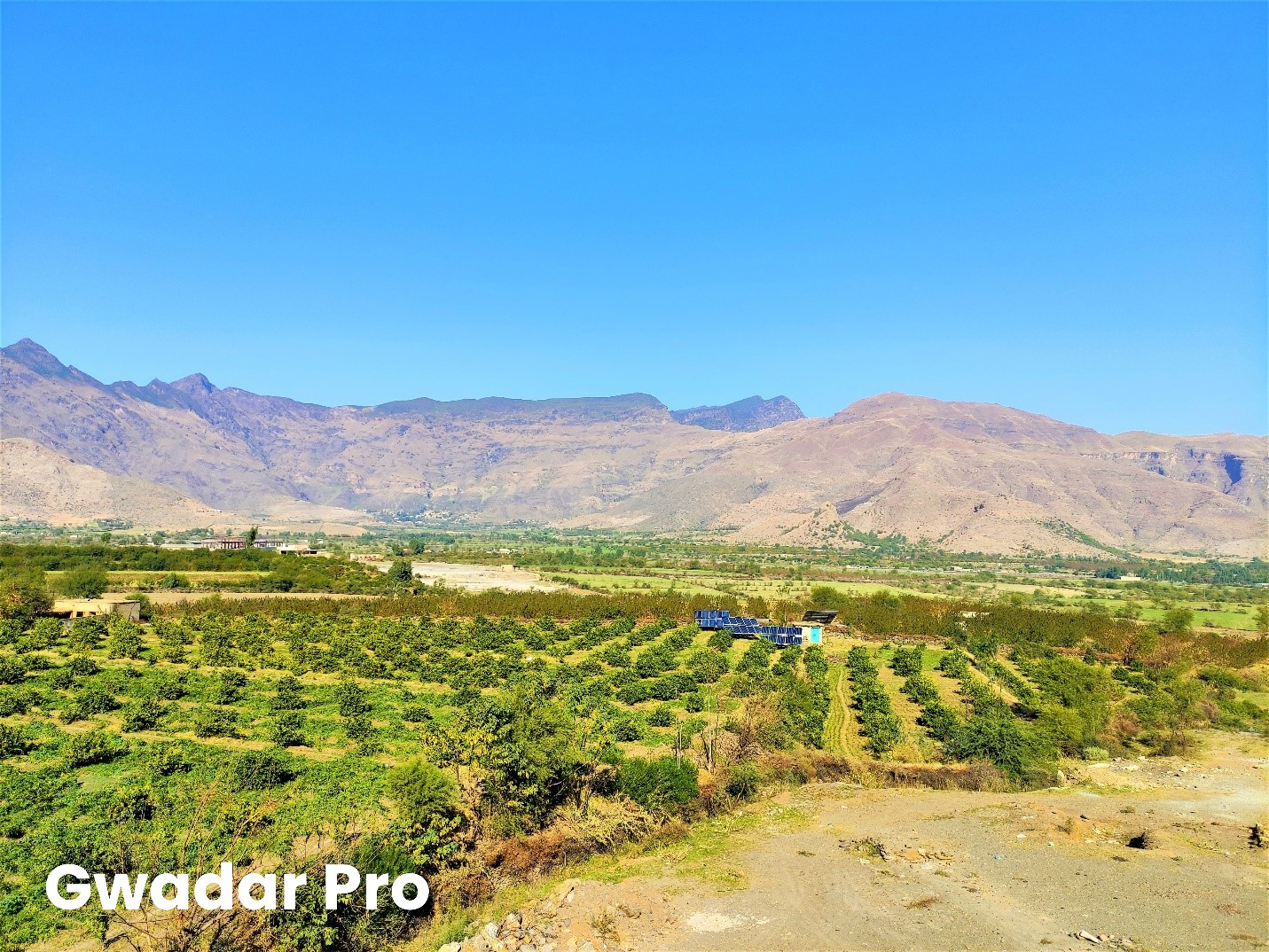
Solar-powered tube well turns barren land green. [Photo by Tahir Ali/Gwadar Pro]
Due to limited resources, Abdur Rahim’s clients opt for cheaper solar-powered tube wells. “I have set up such tube wells worth about Rs. 170,000 to Rs 1,100,000 (1.1 million) for my clients”, he said. According to him, all the photovoltaic (PV) modules he uses are from China while the stands and cables for the system are made in Pakistan.
The majority of submersible water-pumps used in the tube wells are also Chinese products. “Almost 80% of the parts of solar-powered tube wells come from China, while 20% of the parts are made locally,” he said and added that some of the farmers had to spend Rs 10,000 to Rs. 40,000 per month for electricity and fuel consumption but are now running their solar-powered tube wells at no monthly cost.
Pakistan is facing an electricity crisis. Currently, most of the electricity comes from fossil fuel, which is imported and costs a huge amount of money. However, Pakistan has abundant renewable energy resources including wind, solar, hydro and biomass that could ensure large-scale renewable electricity systems in the country. According to Pakistan Economic Survey 2019-20, Pakistan generates 96,382 GWH electricity, out of which only 2,057 GWH comes from renewable energy sources.
According to energy experts, Pakistan has a high potential for renewable energy resources with solar being one of the most convenient and easily achievable mediums. Quaid-e-Azam 1000 MW Solar Park in Bahawalpur, South Punjab, is also part of the China-Pakistan Economic Corridor (CPEC). According to the CPEC official website, the commercial operation date (COD) of 4x 100 MW was attained in August 2016 while 600 MW is under construction.
According to Saeed Hussain, a senior official of the Pakistan Council of Renewable Energy Technologies (PCRET), the PV modules are one of the cheapest ways to get electricity. “Mostly Pakistanis import PV from China, which is leading in solar technology in the world,” he told Gwadar Pro and added that currently around 200 MW electricity is received from PV including from small-scale generation.
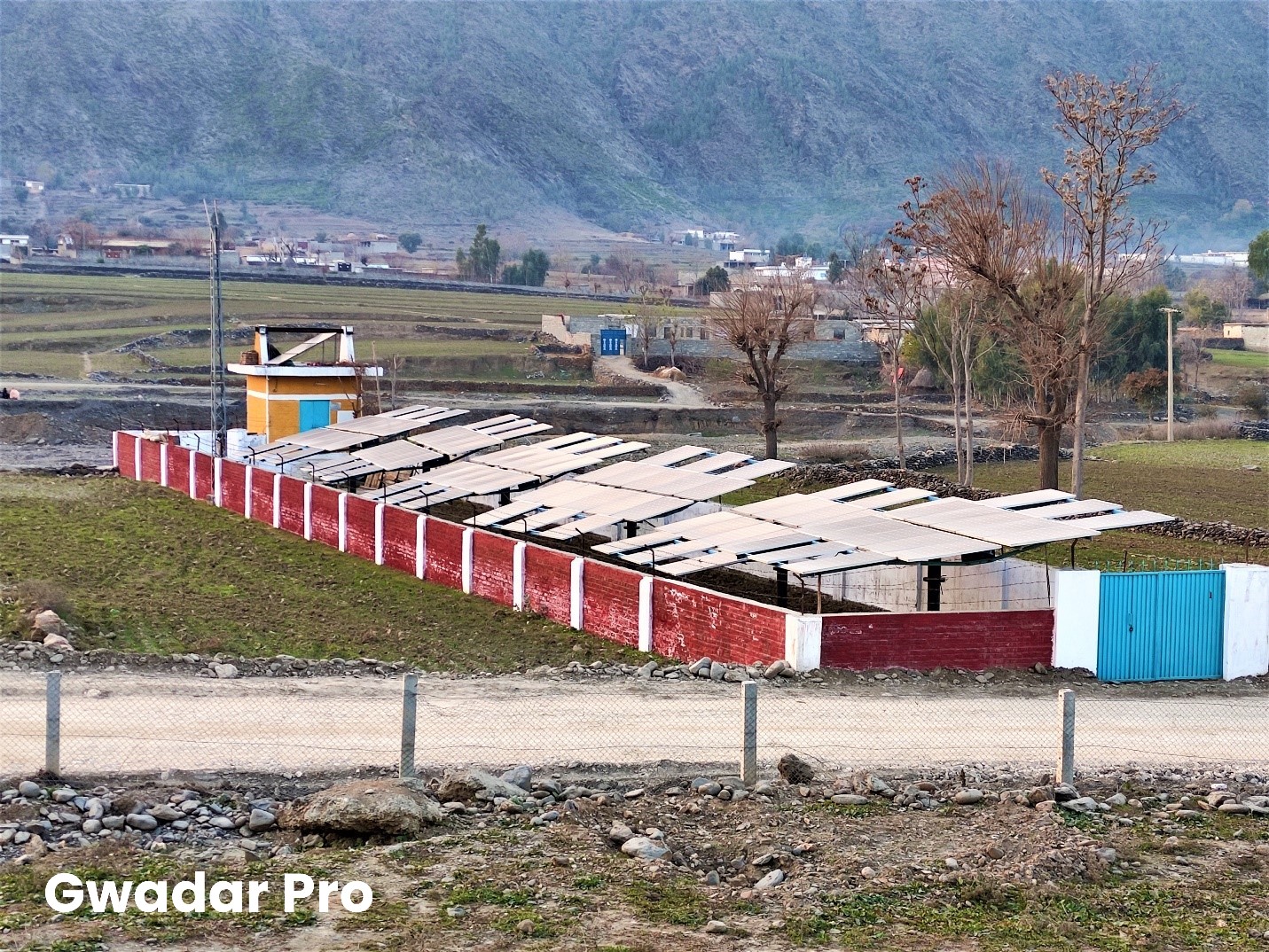
Water supply scheme run with solar energy in upper Malakand. [Photo by Tahir Ali/Gwadar Pro]
In a recent conversation with Sustainable Development Policy Institute (SDPI), Minister for Science and Technology Chaudhry Fawad Hussain said that Pakistan would soon establish its own solar and batteries manufacturing units by establishing a local partnership with Chinese mega-producers. “It would be a big change if Pakistan made its own energy and manufactured its own panels and batteries,” the Minister said.
The Government of Prime Minister Imran Khan has formulated a new Alternative and Renewable Energy (ARE) policy aimed at creating a conducive environment and supported by a robust framework for the sustainable growth of the ARE sector in Pakistan.
ARE Policy 2019-20 envisages the development of large-scale ARE projects in all parts of the country through the active participation of the provinces. The projects focus specifically on wind and solar energy and invite the private sector to develop their business-cum-supply chain for off-grid solar solutions in remote villages.
The policy aims to extend the current share of ARE in the country’s energy from 5% to 20% by 2025 while in 2030 at least 30% of the country’s electricity would be received from renewable energy sources.
CPEC-supported solar energy boosts Pakistani produce cultivation
Tahir Ali | Gwadar Pro
Palai valley produces quality blood red oranges. [Photo by Tahir Ali/Gwadar Pro]
PESHAWAR, Jan. 8 (Gwadar Pro) - Malakand district in northwestern Khyber Pakhtunkhwa (KP) is a strategically important position, which gives access to the ancient, beautiful valley of “Udyana” (Swat). Palai is a small valley in lower Malakand, known for producing high-quality oranges (called malta, citrus sinensis). Palai is the center of a cluster of seven villages namely Bara Bazdara, Koza Bazdara, Sherkhana, Zormandai, Mora Banda and Zangal, all producing citrus for decades.
The oranges of Palai are popular due to their distinctive aroma, taste, color and size. Although the sandy loamy soil of Palai valley is suitable for cultivating oranges, especially the blood-red citrus until recently the lack of a proper irrigation system limited its cultivation to household consumption instead of commercial sale and consumption.
According to Raham Khaliq, a local cultivator, in the early 1980s farmers started digging tube wells running with electric power generators, leading to an increase in citrus orchards. Some farmers also established similar orchards with tube wells running with diesel generators. Hence, with the advent of tube wells in the area, citrus production increased and people began to sell their fruits in nearby markets. However, the majority of the tube wells were established near villages, so remote uninhabited areas, with no electricity supply line, remained barren, or people cultivated wheat, maize and other such crops relying on rainwater.
Talking to Gwadar Pro, Raham Khaliq said that the malta of Palai had established itself in the market due to its quality. In recent years, the number of citrus orchards increased a lot after farmers started installing solar-powered tube wells in their fields. Apart from citrus, local people also cultivate peaches, guavas, tomatoes and other vegetables.

Orange orchard irrigated with solar-powered tube well in Sherkhana village. [Photo by Tahir Ali/Gwadar Pro]
Afzal Hussain installed a solar-powered pump on his tube-well in Bara Bazdara village about five years ago. The tube well brought about a revolution in his farming and he began the cultivation of malta, peaches and tomatoes in his fields, which for centuries had relied only on rainwater and produced only wheat and corn. “Today my land is not only a source of income for my family but our orchards have provided informal jobs for several locals,” .
Zahid Shah is another farmer from Sherkhana village who uses both electric and diesel operated tube-wells to water his orange orchards. However, he is thinking of switching to a solar-powered tube-well. “Due to frequent load-shedding and low voltage and soaring gasoline prices, I am going to move to solar tube-wells,” he told Gwadar Pro adding that many cultivators have started using solar systems and even the arid hilly areas have turned green due to solar-powered tube wells.
The area with bright blue sky and powerful sun receive more than 10 hours of sunlight making it conducive for solar system installation.
Abdur Rahim runs a small engineering workshop in Batkhela, the headquarters of the Malakand district. Although he is not an engineer with a university degree, he has acquired expertise in the solar energy system and has installed many solar systems to meet the electricity needs of households and farms.
Talking to Gwadar Pro, Abdur Rahim said the solar-powered tube wells have brought about an agricultural revolution in the Malakand area. People have started growing fruit trees and cultivating wheat and maize on those arid lands which until recently were only suitable for shrubs while some planted eucalyptus in those fields.

Solar-powered tube well turns barren land green. [Photo by Tahir Ali/Gwadar Pro]
Due to limited resources, Abdur Rahim’s clients opt for cheaper solar-powered tube wells. “I have set up such tube wells worth about Rs. 170,000 to Rs 1,100,000 (1.1 million) for my clients”, he said. According to him, all the photovoltaic (PV) modules he uses are from China while the stands and cables for the system are made in Pakistan.
The majority of submersible water-pumps used in the tube wells are also Chinese products. “Almost 80% of the parts of solar-powered tube wells come from China, while 20% of the parts are made locally,” he said and added that some of the farmers had to spend Rs 10,000 to Rs. 40,000 per month for electricity and fuel consumption but are now running their solar-powered tube wells at no monthly cost.
Pakistan is facing an electricity crisis. Currently, most of the electricity comes from fossil fuel, which is imported and costs a huge amount of money. However, Pakistan has abundant renewable energy resources including wind, solar, hydro and biomass that could ensure large-scale renewable electricity systems in the country. According to Pakistan Economic Survey 2019-20, Pakistan generates 96,382 GWH electricity, out of which only 2,057 GWH comes from renewable energy sources.
According to energy experts, Pakistan has a high potential for renewable energy resources with solar being one of the most convenient and easily achievable mediums. Quaid-e-Azam 1000 MW Solar Park in Bahawalpur, South Punjab, is also part of the China-Pakistan Economic Corridor (CPEC). According to the CPEC official website, the commercial operation date (COD) of 4x 100 MW was attained in August 2016 while 600 MW is under construction.
According to Saeed Hussain, a senior official of the Pakistan Council of Renewable Energy Technologies (PCRET), the PV modules are one of the cheapest ways to get electricity. “Mostly Pakistanis import PV from China, which is leading in solar technology in the world,” he told Gwadar Pro and added that currently around 200 MW electricity is received from PV including from small-scale generation.

Water supply scheme run with solar energy in upper Malakand. [Photo by Tahir Ali/Gwadar Pro]
In a recent conversation with Sustainable Development Policy Institute (SDPI), Minister for Science and Technology Chaudhry Fawad Hussain said that Pakistan would soon establish its own solar and batteries manufacturing units by establishing a local partnership with Chinese mega-producers. “It would be a big change if Pakistan made its own energy and manufactured its own panels and batteries,” the Minister said.
The Government of Prime Minister Imran Khan has formulated a new Alternative and Renewable Energy (ARE) policy aimed at creating a conducive environment and supported by a robust framework for the sustainable growth of the ARE sector in Pakistan.
ARE Policy 2019-20 envisages the development of large-scale ARE projects in all parts of the country through the active participation of the provinces. The projects focus specifically on wind and solar energy and invite the private sector to develop their business-cum-supply chain for off-grid solar solutions in remote villages.
The policy aims to extend the current share of ARE in the country’s energy from 5% to 20% by 2025 while in 2030 at least 30% of the country’s electricity would be received from renewable energy sources.




